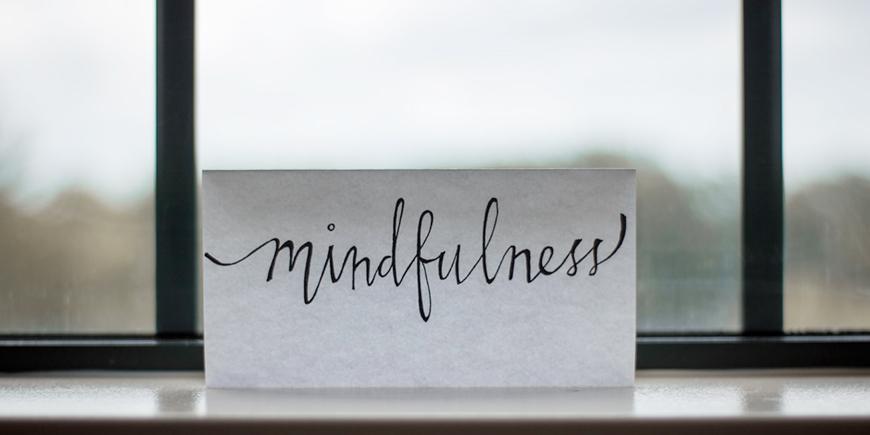
Health & Counselling offers free, weekly meditation classes at Burnaby and Vancouver campus. Learn more here.
What is Meditation? Meditation is not just sitting and breathing. When I think of meditation, images of people sitting cross-legged pop into my head. Meditation seems like an ancient practice that takes years to master. It also seems boring and not for me, a university student who can barely find time to eat lunch in between classes. How could I, someone with no experience whatsoever in meditation, ever hope to achieve the enlightening effects of meditation promised by healthcare professionals? First I had to dispel my current beliefs about meditation, so I started by Googling its definition:
“Meditation (n.) the action or practice of meditating.”
The main goal of meditation it seems, in simplified terms, is to achieve a heightened sense of consciousness and concentration. Seems easy enough. I knew that I definitely have experience with consciousness. I also used a lot of concentration to write this article. When it comes down to it, I realized that maybe everyone is capable of meditating.
Now, what is Mindfulness? As I read about meditation, I came across an unfamiliar term: mindfulness. It seemed to be heavily associated with meditation, and often the two are used synonymously, but mindfulness is not the same as meditation. Clinical Counsellor Sarah Parkes, who runs the Mindfulness Meditation sessions at SFU explained to me this: that mindfulness can be done as meditation, but mindfulness exists in all kinds of forms.
I learned that an example of practicing mindfulness could be focusing on your breathing. This can be done anywhere, anytime. It’s super easy to incorporate mindfulness into your life, and the many benefits associated with practicing it can surprise you. Mindfulness can make you happier and healthier.
When Sarah first told me about the benefits of mindfulness, I was shocked—I couldn’t believe that the simple act of awareness could improve both my mental and physical health so much. Even practicing mindfulness for a few minutes a day before bed or on the bus can have huge benefits, such as mood improvement.
Benefits of Practicing Mindfulness:
-
Relieves stress. As a university student, life can be pretty stressful. Balancing work, school, and a social life can definitely take its toll. Sometimes it can be hard to find time to take care of yourself. The great thing about mindfulness is that it can be easily incorporated into your busy day. You can practice mindfulness everywhere and anywhere, in any position. Despite this, it’s probably better to do it in a quieter space, with fewer distractions (i.e. not in a lecture hall when your professor is talking and your classmates are scrambling to keep up with the lecture slides).
-
Improves academic performance. Ever had to cram before an important exam? I bet you have—I’ve certainly spent many panic-stricken nights studying and hoping my memory wouldn’t betray me. Well, I have some good news: not only does practicing mindfulness improve memory, but it also helps with focus. This means that by practicing mindfulness, you guarantee you won’t have to spend hours reading and re-reading something just to be able to understand and remember it—then you can get some much-needed rest so you won’t go into your exam feeling like a zombie.
-
Improves sleep. Tired of trying to sleep on the noisy bus? What if I told you that you didn’t have to? Instead of trying to catch some shut-eye on your morning commute, you could be well-rested and ready to start your day every day. One physical health benefit of practicing mindfulness is an improved sleep cycle. If you’re like me, you probably struggle with falling asleep. Even if you’re really tired, you could lay in bed for hours thinking about the past, the future, or everything in between. Mindfulness forces you to stay in the present. By focusing on where you are, your breathing, and the feeling of blankets wrapped around you, your mind can rest—and so can you.
-
Increases resilience. Resilience is the ability to quickly recover from setbacks or difficulties. You can improve your resilience (which also improves your optimism, persistence, and tolerance) by practicing mindfulness for a few minutes every day.
-
Enhances creativity. Stuck on a problem? Have writer’s block? By taking as little as ten minutes a day to practice mindfulness, you can clear your head and boost your creativity.
Where should I meditate? Although it is better to meditate in a quieter area, you can meditate anywhere: on the bus, at home, on your work break, and so on. There are all sorts of ways to incorporate meditation into your busy day. Meditation may only take a short time, but its long-lasting, beneficial effects will definitely be felt for the rest of the day.
When can I start meditating? You can start anytime you’d like—you can even start right now! You’ve probably heard of some apps that can help you meditate. Some of these apps include Headspace, Calm, or buddhify. These apps are quick to start up and easy to operate. A simple Google search online can also yield many informative results. If you’re looking for something more face-to-face, SFU Health & Counselling offers Meditation classes on a drop-in session basis every week. These sessions are open to all students, staff, and faculty, and no previous experience required.
Beyond the Blog
-
Learn more about student involvement with Health & Counselling
-
Want to learn more about free Programs for well-being? Click here.
-
Find ways to make SPACE for well-being as a student














